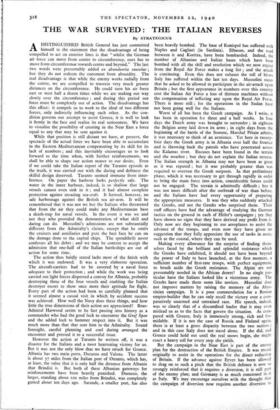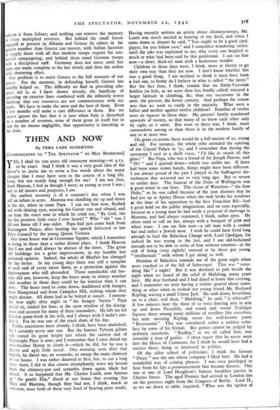THE WAR SURVEYED: THE ITALIAN REVERSES
By STRATEGICUS
ADISTINGUISHED British General has just committed himself to the statement that the disadvantage of being compelled to act on exterior lines is that "whilst the German air force can move from centre to circumference, ours has to move from circumferenoe towards centre and beyond." The last two words were presumably added ex abundantia cautelae ; but they do not redeem the statement from absurdity. The real disadvantage is that while the enemy works radially from the centre, we are compelled to traverse very much greater distances on the circumference. He could turn his air force east or west half a dozen times while we are making our way slowly over the circumference ; and during this period our force must be completely out of action. The disadvantage has this effect: it compels us to work to the ideal of two different forces, only indirectly influencing each other. As the con- dition governs our attempt to assist Greece, it is well to look it firmly in the face and realise its real seriousness. We have to visualise the possibility of creating in the Near East a force equal to any that may be sent against it.
While that position is still distant we have, at present, the spectacle of the actual force we have been able to accumulate in the Eastern Mediterranean compensating by its skill for its lack of numbers ; and this inevitably encourages us to look forward to the time when, with further reinforcements, we shall be able to shape our action nearer to our desire. Even if we could take the Italian report of the Taranto episode as the truth, it was carried out with the daring and deftness the skilful design deserved. Taranto seemed immune from inter- ference. On paper the harbour looks perfectly safe. The water in the inner harbour, indeed, is so shallow that large vessels cannot even sink in it ; and it had almost complete protection against invading sea-craft. It formed, however, no tafe harbourage against the British sea air-arm. It will be remembered that it was not we but the Italians who threatened that from the air they could make any Mediterranean base a death-trap for naval vessels. In the event it was we and not they who provided the demonstration of what skill and daring can do. Mussolini's admissions are not substantially different from the Admiralty's claims, except that he omits the cruisers and auxiliaries and puts the best face he can on the damage done to the capital ships. The spendthrift never confesses all his debts ; and we may be content to accept the admission that one-half of the Italian battleships are out of action for some time.
The action thus baldly stated lacks most of the finish with which it was endowed. It was a very elaborate operation. The aircraft-carriers had to be covered by a naval force adequate to their protection ; and while the work was being carried out light forces dispersed a convoy for Albania, probably destroying three of the four vessels and enabling the Italian destroyer escort to show once more their aptitude for ffight. Every part of the action had been so carefully planned that it seemed almost a casual visit in which by accident success was achieved. How well the Navy does these things, and how little the true dimensions of their action are appreciated! Rear- Admiral Harwood seems to be fast passing into history as a commander who had the good luck to encounter the Graf Spee and the added luck to hammer respect into it. But it was much more than that that sent him to the Admiralty. Sound foresight, careful planning and cool daring arranged the encounter and pressed it to a successful issue.
However the action at Taranto be written off, it was a disaster for the Italians and a most heartening victory for us. But it was not the only blow that we have struck for Greece. Albania has two main ports, Durazzo and Valona. The latter is about 57 miles from the Italian port of Otranto, which has, at least, the value that it is only half the distance from Albania that Brindisi is. But both of these Albanian gateways for reinforcements have been heavily punished. Durazzo, the larger, standing about roo miles from Brindisi, was completely gutted about ten days ago. Sarande, a smaller port, has also been heavily bombed. The base of Konispol has suffered with Naples and Cagliari (in Sardinia). Elbasan, and the road between it and Koritza, have been bombarded. Indeed, the number of Albanian and Italian bases which have been bombed with all the skill and resolution which we now expect from the Royal Air Force makes a long list ; and the attack is continuing. Even this does not exhaust the toll of blows Italy has suffered within the last ten days. Mussolini states that he asked to be allowed to participate in the air-attack upon Britain ; but the first appearance in numbers over this country cost the Italian Air Force a loss of thirteen machines without the compensation of inflicting any upon the Royal Air Force. There is more still ; for the operations in the Sudan have not been going well for the Italians.
Worst of all has been the Greek campaign. As I write, it has been in operation for three and a half weeks. In four days the Dutch army was brought to surrender ; in eighteen the Belgian army laid down its arms ; in eight days from the beginning of the battle of the Somme, Marshal Petain admits, it was necessary to think of an armistice. Yet here in twenty- fan- days the Greek army is in Albania over half the frontier and is throwing back the patrols who have penetrated across the Kalamas river. Excuses have been found in the terrain and the weather ; but they do not explain the Italian reverse. The Italian strength in Albania may not have been as great as it was reputed ; but it was probably greater than was required to overrun the Greek outposts. In that preliminary phase, which it was necessary to get through rapidly in order to bring the main force into action, considerable forces could not be engaged. The terrain is admittedly difficult ; but it was not more difficult after the outbreak of war than before, and the Italians have had every opportunity of preparing the appropriate measures. It was they who suddenly attacked the Greeks, and not the Greeks who surprised them. Their staff officers have had the advantage of studying the German tactics on the ground in each of Hitler's campaigns ; yet they have shown no signs that they have derived any profit from it. Only now are they beginning to use aeroplanes to assist the advance of the troops, and even now they have given no suggestion that they fully appreciate the use of tanks in areas, such as the coastal, where they can be used.
Making every allowance for the surprise of finding them- selves faced by the brilliant and splendid resistance which the Greeks have exhibited, it should not have been beyond the power of Italy to have launched, at the first moment, a sufficient number of first-rate troops, with perfect equipment, to brush aside the Greek resistance. The Alpini are not presumably needed in the African desert! In no single par- ticular have the Italians looked like a victorious army. The Greeks have made them seem like novices. Mussolini does not improve matters by raising the memory of the Abys- sinian campaign. It is a poor commendation for a Roman empire-builder that he can only recall the victory over a com- paratively unarmed and untrained race. His speech, indeed, was so clearly that of a discomfited leader that it may even mislead us as to the facts that govern the situation. As com- pared with Greece, Italy is immensely strong, rich and for- midable. If it is not the case of Russia and Finland again, there is at least a gross disparity between the two nations ; and in this case Italy does not stand alone. If she did, and Greece could hold out until the real snows begin, she might exact a heavy toll for every .step she yields.
But the campaign in the Near East is part of the enemy plan for the destruction of the British Empire. It was meant originally to assist in the operations for the direct reduction of Britain. If the advance against Egypt has been allowed to drag on to such a pitch that the British defence is now so strongly reinforced that it requires a diversion, it is still part of the enemy plan; and Germany is as much concerned in .it as Italy. We may encourage ourselves with the thought that the campaign of diversion now requires another diversion to reileNn it from failure; and nothing can remove the memory of these multiplied reverses. But behind the small forces engaged at present in Albania and Greece lie others in far greater number than Greece can muster, with Italian factories to supply them with all that modern troops require for suc- cessful campaigning; and behind them stand German troops with a disciplined staff. Germany does not move until her plans are made complete to the last detail; and then she strikes with shattering effect.
Our problem is to assist Greece to the full measure of our power. For the moment, in defending herself, Greece has notably helped us. The difficulty we find in providing ade- quate aid is, as I have shown already, the handicap of operating on exterior lines combined with the infinitely worse handicap that our resources are not commensurate with our needs. We have to make the most and the best of them. Even a few months will make a vast difference in them. But we cannot ignore the fact that it is now when Italy is disturbed by a number of reverses, none of them great in itself but in sum by no means negligible, that opportunity is knocking at the door.



























































 Previous page
Previous page